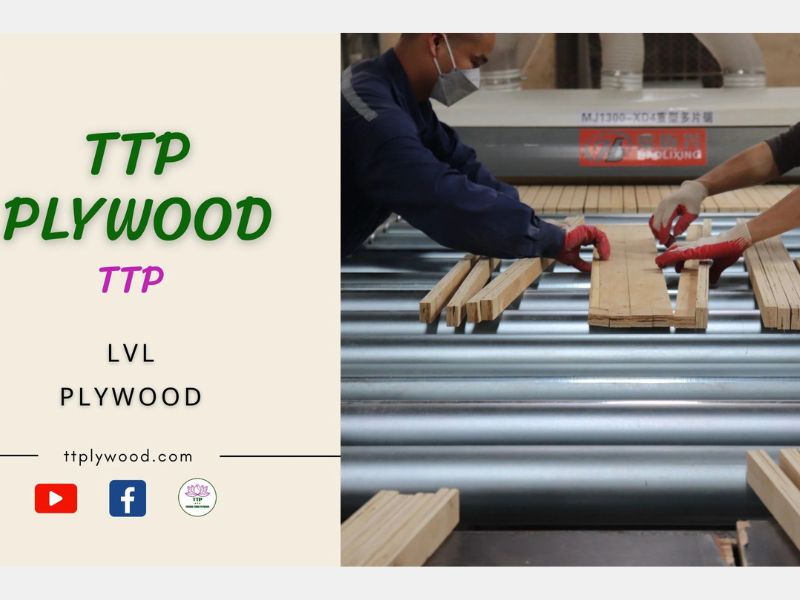-
-
-
Total payment:
-

Things you need to know about LVL? Advantages and disadvantages
Posted by Đỗ Tiến Hải at 09/10/2023
What is LVL plywood?
Laminated Veneer Lumber (LVL) is a high-performance engineered wood product widely used in structural and industrial applications around the world. With more than 30 years of global use, LVL has become an essential component in construction frameworks, structural beams, furniture production, and pallet manufacturing.

LVL is manufactured by peeling thin veneers from logs, inspecting each layer for quality, and bonding them together in a parallel grain orientation under specific heat, pressure, and adhesive conditions. This process creates a product that is:
- Strong
- Uniform
- Dimensional stable
Each veneer layer is carefully inspected to meet internal grading standards, ensuring the final LVL panel delivers consistent strength and durability.
Advantage
According to the APA – The Engineered Wood Association, laminated veneer lumber (LVL) is recognized globally as a high-performance engineered wood product widely used in structural framing applications. Unlike traditional lumber, LVL is manufactured under controlled conditions using multiple layers of wood veneer bonded together with strong adhesives. This results in a product with greater strength, stiffness, and dimensional stability, especially in long-span or load-bearing uses.
APA further notes that LVL is highly resistant to warping, twisting, and shrinkage — making it an ideal choice for beams, headers, and rim boards in residential and commercial construction. For buyers and specifiers around the world, sourcing LVL from verified manufacturers not only ensures compliance with performance standards like ASTM D5456 or EN 14374, but also supports sustainable use of wood resources through engineered optimization.
- LVL plywood has many outstanding advantages compared to conventional sawn wood:
- LVL plywood can be made from many different types of popular wood such as: pine wood, acacia wood, eucalyptus wood, rubber wood
- LVL plywood can control quality criteria such as: thickness, width, length, moisture and consistency. The length of LVL plywood does not depend on the size of the log, but on the production technology of the enterprise.
- LVL plywood is very durable and resistant, much lighter than natural wood boards, and the price is also cheaper.
- Using LVL plywood helps us use wood resources more effectively.
Disadvantage:
While LVL plywood offers many structural and economic benefits, there are some limitations to consider. Because it is composed of multiple layers of thin veneers bonded together in the same direction, LVL can be vulnerable to delamination or separation of layers if exposed to excessive moisture or poor manufacturing conditions.
Additionally, cutting or machining LVL may release more adhesive-related emissions than natural wood, depending on the glue type used. This is why buyers should ensure that the products meet environmental standards such as E0 or CARB Phase 2 certifications.
It's also worth noting that LVL lacks the aesthetic grain variation of solid timber, making it less suitable for exposed decorative use unless overlaid with a finish. Therefore, proper quality control during production and storage is critical to avoid warping, moisture absorption, or surface defects — especially for export shipments.
=> When customers buy LVL products from TT PLYWOOD, we have a highly skilled professional inspection team. Always check quality 1:1 to eliminate defective and poor quality products. So that when delivered to customers, the products will be of the highest quality.
For more details, please don't hesitate to contact us for the high-quality and the best quotation. We will not let you be disappointed.
Common Applications

LVL is used extensively in both residential and commercial construction, as well as in industrial packaging. Typical applications include:
- Structural beams and headers
- Wall and floor framing
- Formwork and scaffolding components
- Bed slats and furniture frames
- Industrial crates and pallets
Whether you're building strong load-bearing elements or producing durable furniture, LVL delivers the reliability and flexibility needed across industries.
❓ Frequently Asked Questions About LVL Plywood
1. What is LVL plywood used for?
LVL (Laminated Veneer Lumber) is commonly used in construction applications that require high strength and stability. Typical uses include beams, headers, floor joists, formwork structures, and industrial pallets.
2. Is LVL stronger than regular plywood?
Yes. LVL is generally stronger in the direction of its grain because all veneer layers are aligned in parallel. Plywood, with its cross-layered structure, provides multidirectional stability but typically less strength in any one direction.
3. Can LVL be used outdoors?
Standard LVL is not designed for prolonged outdoor exposure unless it is specially treated for moisture resistance. For outdoor applications, it's important to request water-resistant glue (e.g., phenolic) and proper sealing.
Why Choose TT PLYWOOD’s LVL?
At TT Plywood, we go beyond just manufacturing. We ensure each piece of LVL meets the highest quality standards through:
- 1:1 Quality Inspection – Every single board is hand-checked by experienced staff
- Certified Facilities – FSC, CARB P2, CE-certified production lines
- Export Expertise – Serving demanding markets in Korea, Malaysia, the Middle East, and the EU
- Custom Solutions – Dimensions, glue types, and species tailored to your project
When you choose TT Plywood, you’re not just buying a product — you’re partnering with a trusted, responsive supplier that understands international quality and logistics.
📩 Contact us today for a quotation or to request certified samples. We are confident you will be satisfied with our consistency, service, and support.
-------------------------------------------
Hotline/WhatsApp/Line/Kakao: +84 326 942 288
Email: info@ttplywood.com
Website: https://ttplywood.com/










